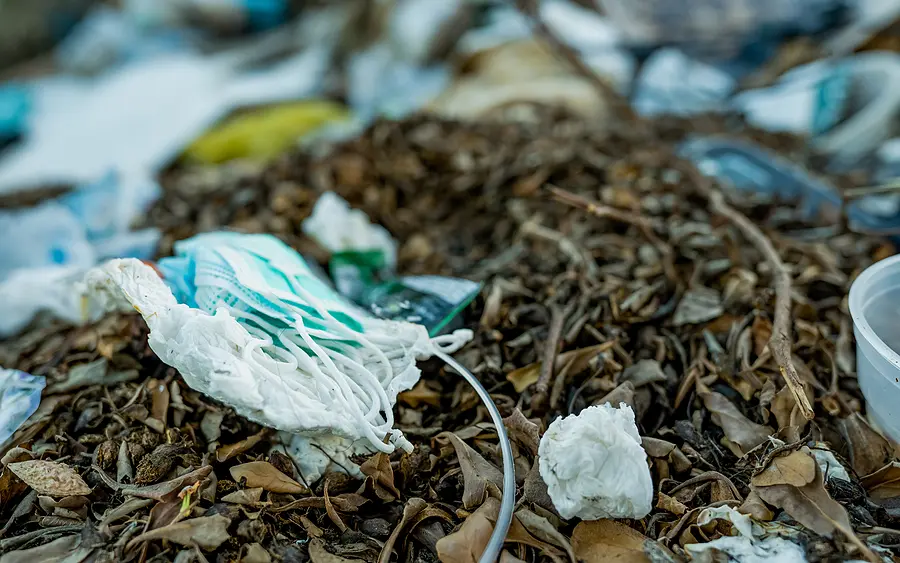The Cost of Improper Medical Waste Disposal

Improper medical waste disposal can be harmful in many ways. Its effects are far-reaching and hazardous to countless others with chemical and/or biological contamination. In addition to the negative effects on human beings, it also hurts the environment when contamination seeps into the soil, waterways, and atmosphere. Improper medical waste disposal can be damaging to your health and business in more ways than one.
While that problem isn’t anything to sneeze at, there are much more significant problems looming over the world because of improper medical waste disposal. Improper medical waste disposal can create civil and even criminal issues for companies doing and handling the disposal. It can create human health risks and impact our environment for years.
What Is Improper Disposal Of Medical Waste?
Improper disposal of medical waste is any disposal method contrary to what your Medical Waste Disposal Plan (MWDP) outlines. If you work for or run a business that generates medical waste, you should have a clear MWDP. Every employee at your site should understand the procedures within, and have free access to it for reference.
How Much Could Improper Disposal Possibly Cost?
The Business Impact of Improper Medical Waste Disposal
The fines established by the Resource Conservation And Recovery Act (RCRA) for violating medical waste disposal regulations might be. The RCRA Civil Penalty Policy shows the method for determining severe penalties. Section XI provides several possible scenarios.
Improper disposal of medical waste is likely to lead to closing your doors. Not many companies are equipped to face fines in the hundreds of thousands, or millions of dollars. Fines usually range between $5,000 and $70,000, but that upper end could put a small business out of business.
The consequences don’t necessarily have to stop there, either. Malfeasance charges against a corporation when it involves a death could result in criminal charges. Malpractice charges against a doctor could also be criminal if the doctor’s actions resulted in death. You could face from 2 to 15 years in prison per offense if convicted.
Even if the fines aren’t fatal, public sentiment isn’t going to side with you. Negative public perception regarding such serious matters is enough to drive business elsewhere. Most individuals want to work with conscientious companies that are doing their best to mitigate damage to people’s health and the environment. Even a single violation of the RCRA is enough to drive business and profits into the negative.
The Health Risks Of Improper Medical Waste Disposal
Realistically, improper disposal could cost lives. The dangers can be anything from contracting an incurable disease to death itself. Many of the hazards medical waste poses are easily preventable, as long as it’s handled appropriately. You can’t assign a monetary value to practices that safeguard human life. Ignorance or negligence are not excuses to cut corners, especially when the stakes are so high.
Direct exposure to improperly disposed of medical waste is an obvious risk anywhere along the disposal line. It can occur when a janitor handles unlabeled bags containing medical waste. Direct exposure can occur during the sorting and handling of regular waste at disposal sites. When sharps are mishandled, needle sticks and even the reuse of needles are risks. Medical waste is commonly scavenged for needles and other usable items in some parts of the world.
The Environmental Threat of Improper Medical Waste Disposal

Improper disposal of medical waste at a facility not built to contain it is likely to contaminate the ground beneath it and eventually contaminate drinking, ground, and surface water. Improper treatment of medical waste with chemicals meant to neutralize the waste can result in chemical contamination of the surrounding area.
Burning medical waste is a standard practice permitted by regulations; however, that does not preclude incineration at disposal sites from being improper. The issue is challenging since incineration releases toxins and particulate matter into the air. Incineration of heavy metals or materials with high metal content (in particular lead, mercury, and cadmium) can spread toxic metals in the environment. Incinerated materials containing or treated with chlorine can generate dioxins and furans, human carcinogens.
Real World Examples of Improper Medical Waste Disposal
UPMC and AHN were Both Fined by the Pennsylvania State Department of Environmental Protection

June 21, 2016
Twelve University of Pittsburgh Medical Center (UPMC) hospitals were found in violation of medical waste disposal procedures by Pennsylvania’s State Department of Environmental Protection (DEP) this year.
UPMC’s improper disposal was first noticed when residents of a neighborhood located next to a landfill identified red bags full of untreated medical waste in the landfill. After several authorities were notified, the DEP initiated an investigation that lasted two years.
During the investigation, the DEP also found that Allegheny Health Network (AHN) was improperly disposing of medical waste and issued violations as well. UPMC was issued $451,000 in fines, while AHN was issued $86,900. Both hospitals were required to review and update their medical waste policies and re-train employees on updated procedures.
The DEP reported that UPMC hired a medical waste disposal contractor to ensure its compliance with federal and local laws and prevent further violations.
Arizona Star Valley Veterinary Clinic Fined for Veterinary Medical Waste Violations
November 30, 2011
The Arizona Department of Environmental Quality (ADEQ) and the Arizona Attorney General’s Office found Star Valley Veterinary Clinic in violation of standard medical waste disposal procedures in 2011. The investigation showed that the clinic had been improperly disposing of syringes contaminated with blood from 1999 to 2009.
The clinic was issued a $65,000 fine as punishment for the violation. Funds from the fine were directed to the Humane Society of Central Arizona to help treat sick animals and educate veterinary professionals on the proper management of medical waste.
New Hampshire Cheshire Medical Center Pays for Violating Medical Waste Procedures
November 5, 2015
New Hampshire’s Department of Environmental Services (NHDES) charged Cheshire Medical Center for violating proper medical waste procedures in November 2015. During a routine inspection in May 2013, NHDES discovered that Cheshire Medical failed to identify certain pharmaceutical wastes as hazardous and dispose of them properly.
The medical center also was not following medical waste storage guidelines or adequately training employees on disposal procedures. Cheshire Medical Center was fined $200,000 for the violations.
Medical Waste Laws Are Not Only for the Medical Industry
Be aware that medical waste is not only generated by businesses in the medical industry. Businesses and institutions in transportation, manufacturing, hospitality, department stores, education, and cleaning services have been charged with penalties for improperly disposing of medical waste in the past as well.
The consequences of violating standard medical waste disposal procedures can be severe. The reckless disposal of medical waste does not only result in monetary fines—it can do enormous damage to a business’s reputation, cause harm to the health of employees and the public, and have corrosive effects on the environment. Ensuring medical waste is properly disposed of will protect you and your company from the potential business-threatening fines brought about by damaging lawsuits.
Keep in Compliance and Avoid Fines with Medical Waste Pros Today
Medical Waste Pros can help you find a compliant regulated medical waste disposal company near you. We’ll help you select the containers, schedule, and system that works best for your organization. Not to mention all contractors we send your way have been fully verified and vetted within our network of professionals. To get free quotes on regulated waste disposal, fill out the form, or give us a call at (888) 755-6370.










